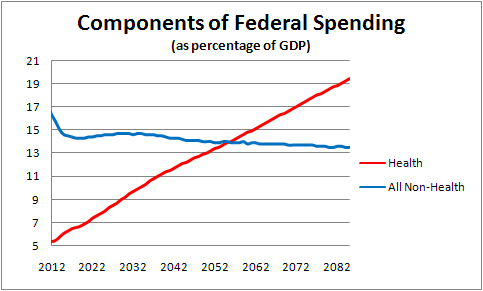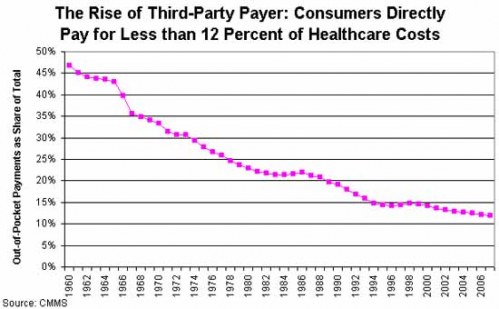Study Finds That Affordable Care Act Isn’t All That Affordable
Another government program isn't going to bring health care costs under control.
A new study published today says that the Affordable Care Act is going to be far more expensive than we’ve been led to believe:
The Affordable Care Act will drive health care spending up slightly, to nearly a fifth of the country’s gross domestic product by 2020, while extending insurance coverage to 30 million more Americans, a new report from CMS projects.
But health care’s hefty share of the country’s economic output is reached through an average annual growth in medical spending of 5.8 percent over the next decade — just 0.1 percent more than would have been spent without the health reform law, the report claims.
CMS published its findings this morning in Health Affairs. The report also projects that once all the data are in, health spending in 2010 will have grown a historically low 3.9 percent — slightly lower than the previous record low growth of 4 percent in 2009.
That’s an aftershock of the recession, which cost millions of people their jobs and, consequently, their health insurance, slowing medical spending.
At a Health Affairs forum Wednesday, CMS chief actuary Rick Foster, who has a record of questioning long-range spending projections based on overly optimistic assumptions, nonetheless said that “we like to think that the reality in 2014 will be much closer to the projections” than similar projections from the past.
If implemented as written, the health care law will “create a whole new world of health care spending,” Foster said.
Not surprisingly the White House tried to spin the report by pointing out the fact that health care costs grew at an historically low rate in 2010 but, of course, that had nothing to do with the ACA and everything to do with the economic downturn that started in 2007. Their response to the reports findings on the long term costs of teh ACA was basically the rhetorical equivalent of unicorns and rainbows:
But the report doesn’t tell the whole story.
The Affordable Care Act creates changes to the health care system that typically don’t show up on an accounting table. We know these new provisions will save money for the health care system, even if today’s report doesn’t credit these strategies with reducing costs.
In other words, the plan will work because of magic, pay no attention to those numbers and the reports prepared by actual economists.
None of this should be a surprise, though. We’ve known for a long time now that health care costs were increasing at a rate far faster than the general rate of inflation and as this chart from the CBO shows (h/t Yuval Levin), health care is fast on the way to becoming the biggest component of the Federal Budget:
In other words, unless we bring health care costs under control, they will at some point overwhelm the economy to the point where we’ll be able to afford almost nothing else, unless we start denying care. As Austin Frakt notes, however, there’s absolutely no historical evidence that “bending the health care cost curve” is going to happen. In support of that hypothesis, Frakt provides this chart, which tracks health care costs as a function of GDP going all the way back to 1935:
Frakt comments:
If, by action of politicians or the market, the health care spending curve is not bent, one might argue that this reflects our collective desire, our revealed preference. The history of health care spending in the US is consistent with the hypothesis that we view health care as a luxury good, one on which we spend more of our wealth as that wealth grows….The great question [this chart] suggests to me is that if health is a luxury good, why should we expect the health spending trajectory to change?
If we continue on our current path, with true cost of health care being eternally shielded from the consumers of health care thanks to third-party insurance, most of which is paid for by employers, I’m not sure that we can without either serious declines in the quality of care, or rationing, neither of which anyone seems to want. I noted back in June that the core of the cost problem in health care can be found in the fact that the people who consume it have no incentive to even be aware of its costs:
[We are at] the point where now just 12% of health care costs are paid directly by consumers:
When consumers are insulated from the cost of a good or service, they aren’t going to take the price of that good or service into account when deciding whether or not to purchase it, which means that the normal supply-demand price mechanism isn’t going to work. In the long run, this means prices will go up. Of course, it’s true that health care itself is a good that isn’t necessarily subject to the same market prices as, say, groceries. We all want to live forever, and when we’re sick we want to feel better. Nonetheless, when someone else is paying the bill and, as the chart above shows right now someone else (the government and private insurance) is paying 88% of the bill on average, consumers have every incentive to use as much health care as they can.
How we get that number turned around is a tough question, admittedly, and there will be some situations where the attitude will be “cost is no object” when it comes to health care. However, if the CMS report on the Affordable Care Act tells us anything, it’s that more government involvement and further displacement of market forces from the health care marketplace isn’t going to do much of anything to bring costs under control. So, introducing market forces into the question strikes me as a pretty good idea.









Naturally, this was utterly unforeseeable and unpredictable.
Those of us who foresaw it and predicted it were just insanely lucky, and our predictions should be ignored and forgotten as quickly as possible.
“If you think health care is expensive now, wait until you see what it costs when it’s free.” — P.J. O’Rourke, May 6, 1993.
J.
I certainly agree that this is a problem. So how do we get the costs out in front of consumers?
The only way I can think of would be to remove third party insurance all together and have patients pay doctors and hospitals directly themselves.
So the ACA adds 30 million more Americans the healthcare rolls (and that number should rapidly increase as the pre-HCR trend of employers dumping employee insurance continues), it also sets baselines of improved coverage for all insured, and an influential research group with a history of questioning overly-optimistic government projects ends up predicting an increased federal healthcare spending growth within the margin of error (0.1%)? This at the same time they avoid estimating in most of the cost cutting initiatives the legislation included (not complaining here — CBO did the same)?
There’s a reason why AEI in that Politico article is like, “WTF? This can’t be right!?” Or, in other words, are you sure this study is saying what you think it’s saying?
Don’t quite understand your point or your logic Doug.
How is this anything other than a great bargain?
But this “current path” that you describe is essentially the world that the private markets have given us. You complaint is at heart against the notion of insurance itself, not the ACA – other than the fact the ACA does not do away with third party insurance.
@ Doug…
Well you’ve got JTea on your side…so you got that going for you…
At least that’s your partisan reading of the report. The facts though…well facts are a cruel mistress. But just to play devils advocate – point to one other successful free-market health care system.
We have two market-based programs already – and neither Medicare Part D nor Medicare Advantage have come close to achieving sustainable cost growth.
Nations that have more government intervention achieve better results for less cost than our “free-market” system.
Only the richest among us can afford to pay for catastrophic care…getting a liver transplant is not like picking up a quart of milk. That means most of us must count on insurance. This means the Insurance Company, not the individual, is making the decisions. The last time I checked my Insurance Company was more interested in their profits than my health.
I pay more in insurance than I do in taxes. And to date I have gotten nothing in return. At least the government paves the friggin’ roads.
If a good or service is given away free, people will consume more.
We can easily see if cars were given away free, people would demand Mercedes and Lambourghinis.
So if medical procedures are given away for free, what medical procedure would you go and demand?
Would you waltz down to the hospital and demand a free spinal tap, perhaps? Maybe you might avail yourself of a free liver biopsy?
Or maybe join the stampede for free enemas?
The fact is, medical care is not a consumer good like cars or toasters.
Unlike cars or toasters, medical care is a service that people really don’t want to receive, and struggle mightily to avoid receiving.
As an example, suppose you were given a voucher for your familiy’s medical care. Then suppose your child was diagnosed with cancer.
Would you comparison shop and get the bargain basement chemotherapy?
Or would you get the best treatment, even if it meant expending your last dime and being homeless?
Forcing people to carry the cost of their own medical treatment wouldn’t reduce the cost curve by even a dime; it would only impoverish those who get sick.
@Jay Tea: You’ve got a deal. I will forget you and ignore you immediately. Don’t say I never did anything for you.
@Liberty60: Actually, the preferred Libertarian result is that rich people get treated and the rest of us die. Because that’s the glory and the beauty of the market.
The ACA wasn’t meant to reduce the overall cost of healthcare spending; it was meant to redistribute that cost so that millions more people have health insurance.
Criticizing the law for not doing something it was not meant to do is, uh, strange.
@Anderson:
AHA!
So you admit that it would be cheaper to let sick people die.
And yet you insist upon forcing Job Creators to pay money out of their pockets to keep sick people alive.
Have you no shame?
At long last, Sir, have you no shame?
ACA expands coverage more than it bends the cost curve. OK… so what? Every stupid debate and compromise about healthcare ensured that that would be the case. Bush did medicare part D for a reason, and that reason is that it’s easier to expand access than cut costs. Obama tried to wade in those waters, and all you get is “death panels” this and “no public option” that. So the compromise doesn’t do anything to cut costs.
If the starting point were something like Wyden-Bennet, the result would have been the same.
Welcome to america. Economically welfare would work better if we just gave poor people cash. But it’s too easy to demonize poor people so we have all these byzantine tax credits and vouchers, and all sorts of bureaucratic nonsense.
It’s the political process that gives us this rube goldberg bullshit. Not whether or not something is “market oriented” or not. Whatever the hell that means. If the objective is cutting costs and expanding coverage, then you end up with single payer at the least, something like the NHS as the extreme. If the objective is meeting some stupid ideological middle ground then you get ACA.
Given this paragraph:
To concentrate on “spending up slightly” seems odd, compared to ” extending insurance coverage to 30 million more Americans.”
30 million is actually a lot of people.
But not the right people apparently. At least not the ones who have gainful employment making six or more posts per day on OTB.
Nice work, if you can get it.
My objection to the ACA was always that it did nothing to reduce costs. The problem is that there are a lot of expensive medical procedures that have little if any benefit. Bypass surgery is one example.
My brother was recently diagnosed with non-Hodgkin’s lymphoma. A few years ago he would have been given chemo-therapy and radiation treatment. The problem is that studies showed that people who received no treatment lived longer than those who did. In fact many of those who were not treated went into remission without treatment.
And can we as a society afford to give an 86 year old a 6 figure treatment that they a 50-50 chance of surviving and if they do will only live another 3 to 6 months with a significantly reduced quality of life – I’m talking about my father.
Yes, we need “death panels” but the real opposition doesn’t come from the Tea Party but the medical industrial complex.
@hey norm:
Point to one other successful implementation of the idea that all men are created equally, and that they are endowed by their creator with inalienable rights. You can’t? Well, then maybe we oughta tear that system down too, huh? I mean, nobody in Europe’s been successful at it, so it must not be valid, huh?
The answer here, is get government out of the heathcare and wealth redistribution businesses.
Says the retired medicare recipient who spends his free time whining on the internet yet is immune to irony.
@Eric Florack:
What a bizarre way to attack universal health care!
If you believe we are all given that spark, but that any one of us might experience “very bad luck,” then of course you’d go with a system more like the Canadian, or the French, or the German.
The supreme irony of course being that when you step up to that, you also save money.
While we’re at it, why don’t we also repeal the law that prohibits emergency room personnel from turning away anyone who doesn’t have the ability to pay…hell, that should save a few more dollars and please the Floracks of the world too…
@john personna:
Perhaps, but that wasn’t the target. Rather I was dismissing his argument that one assumes was made in support of it. Two vastly different things. Read my comment within the context of your specific argument and try again.
@Anderson: The Obama WH and the economists who helped designed the plan stated many times that the ACA was meant to control costs. No one believed it would, but the problem is that in ramming through the ACA, we lost our best legislative chance to pass real reforms to control the costs. All upwards cost pressures remain under ACA with nothing to balance them.
As a response to the “look where the free market has gotten us” posts: I think this meme is destructive for the healthcare debate. We have a mixed system and exist farther towards the free market side than, say, the French system, but that doesn’t explain our problems or their successes. Most people can agree on certain necessary changes, such as: less subsidization of huge hospitals in favor of community clinics, ending the tax breaks that encourage employer-based care, stopping the fee-for-service payment system, etc. Note that none of these are results of “free market” or “socialist” (or whatever policies), they were poor constructed patches to old problems that have now added up.
In other words: please stop over-simplifying, it makes the debate useless.
@john personna: Yes, but if you have nothing but contempt for other human beings — that is, if you’re a libertarian — what difference does that make?
@WR: You fail at libertarianism. The core concept of libertarianism is respect for others and their rights. Your strain of iberalism is about disrespecting the individual, presuming that they can’t take care of themselves or exercise their rights and freedoms, so they need you and the rest of the elites to make their choices for them.
J.
@Eric Florack you said:
If you believe that, and in universal health care, then you must believe that there will always be private charities in place for each and every person who falls ill. Except we know that’s not true:
I think there is a gap between conservative or libertarian dream and our stark reality.
@Jay Tea:
The point is, Jay, that Canada, France, Germany, and others manage to spend less on health care than we do AND grant more “rights.”
The absurdities we center-and-left see from the right on this is (a) that they are happy spending more, and (b) their ideas of how it might work otherwise seem like fantasies.
That is, if you think you can reliably find, treat, and release every poor unfortunate who falls on bad luck with nothing but charity … you are either lying or deluded.
Oh, I guess I forgot the other fantasy. That is that if there were no enforcement, and we all just got to make our best deals with Blue Cross or whoever, rates would suddenly drop … because that’s what companies do whenever the watchdogs are pulled off … that’s the ticket.
When my father was diagnosed with cancer they told him he had 6 weeks without chemo and 6 months with it. The oncologist actually seemed angry when he declined treatment.
Your question is a very good one. My dad did pass away six weeks later. But he did it at home, with minimal care and cost (hospice) and with as much dignity as was possible under the circumstances.
I’m not afraid anymore!
Cheer up! The Revolution has started –
If you are an American, you have to read “Common Sense 3.1”
It’s Time to throw out the garbage!
@ Eric…
Look up false equivalency.
If by “that law in place before Johnson…” you mean Hill-Burton, EMTALA applies to many many many more hospitals. There are only 185 Hill-Burton obligated facilities in the country. Some states don’t have any.
There is no model anywhere of a functioning, low cost market based health care system. It is a fantasy.
Steve
@Jay Tea: Yes, JT, all you grand libertarians love the woman dyiing with cancer who has no insurance so much you want to give her the gift of dying in agony in the street,. Spare me your platitudes. All you care about is yourself and not having to pay a nickel in taxes. All the philosophy is just a cover so you can sleep.
No, it wasn’t, thanks for playing, though, better luck next time…
When did he ever claim to be in favor of universal health care?
@Liberty60
Obviously you’ve never worked in the medical field. You have no idea about the abuses and overuses when people don’t have to foot the bill — none whatsoever. I guess ignorance is bliss……
It’s just a matter of time before we will not have the services or physicians to deal with the medical load. Many doctors have taken early retirement since the health care bill passed. As many as 45% of the doctor work force, prior to the HC bill’s passage, said they would consider this option. Also, more and more physicians are setting up private practices, whereby patients pay an annual fee to become their in-house patients, excluding the government altogether.
The UK socialized medicine, long envied by many in this country, has now run it’s course, with people paying dearly, in the quality and accessibility to health services. Below’s article has run all around the net today:
NHS begins rationing operations
@jan: Gosh, that couldn’t be because the UK government has been taken over by right-wingers with an “austerity” fetish that means transferring the nation’s wealth from the middle class to the ultra-rich, could it? Gosh no, it must be because it’s unsustainable. After all, the Tea Party says so!
@anjin-san: Sounds like a mensch. I hope I have that strength when the time comes.
Kind of don’t see Obama spinning this.
Kind of do see Mataconis spinning.
I don’t think I have met anyone who “envies” the system in the UK. Most agree it is a poor implementation and that there are much better models – France for one.
Funny, the right has been telling us about how socialized medicine in Europe is on the verge of collapse since what – 1980? Here we are all these years later and it is still poised at the brink.
@jan:
That’s interesting, because the number of physicians per capita in the US has been steadily increasing:
http://facts.kff.org/chart.aspx?ch=204
FYI: That 45% figure just applies to primary care physicians, not the entire doctor work force. The number for the entire doctor work force is 22%. The survey that those numbers come from is here:
http://www.themedicusfirm.com/pages/medicus-media-survey-reveals-impact-health-reform
and you can click the link at the bottom to see the 22% number (I’ve had this discussion with some one else, long ago).
In any case, I believe that this country should be trying to achieve something like this (to quote a particular health care proposal):
Even though people may disagree on how to achieve that goal and even if doing so means having to deal with some of the issues inherent in trying to achieve it.
@Davebo: ” At least not the ones who have gainful employment making six or more posts per day on OTB.”
Wait a second, he get PAID for this? Most of the “professional” bloggers I’ve known are guys who live in their mom’s basement and are hoping that sometime “this is gonna start really paying off.” I thought he’d figured out a way to bill his clients for this schlock.
@steve: Depends what you mean by ‘market based’. Market based providers, sure. Market based insurance system, no. See, eg., Switzerland, with non-profit, highly regulated insurers, and largely independent providers. The French arrangement, with a mix of public and private entities at the financial and provider levels, is probably the best overall in terms of efficiency, quality, and overall liberty for all concerned.
1. Hardly anyone on the Left in the US has suggested implementing the NHS system (where the government runs the hospitals and such directly, IIRC). Rather, the Canadian, French, German, Australian… there are so many other choices that are available where the government plays the role of insurer and the services are provided by companies.
2. Rationing… EVERY HEALTHCARE SYSTEM ON EARTH RATIONS. It’s a matter of how the rationing is done. The Libertarian approach would be to ration by price. Got the money? Get the treatment. Don’t? You lose. The socialistic approach is to have the same benefits for all, with a cut-off for all. Of course, most systems (all?) allow those with spare money to purchase additional coverage over & above the governmental plan, which makes sense to me. I’ve no problem w/that.
3. We’ll have to wait and see what the PPACA ends up doing. The goal was to attain universality of coverage and make some common-sense reforms to try and lower costs, but the PPACA ended up being such a compromised thing I doubt it will deliver much in the way of cost control. The PPACA is *not* single-payer, which from a cost-control perspective is a problem.
4. The PPACA is, essentially, the healthcare reform initially designed by the Right back in the late 80s/early 90s, and eventually put into effect in MA by Romney. Now, of course, it’s horrible socialism. What it actually is, however, is a mushy compromise between what liberals actually wanted (and what works elsewhere) and what people who used to be called Conservatives (now Blue Dog Democrats) wanted/could accept. In other words, it’s a mess.
@jan:
Seriously- give us some links showing how people consume more medical procedures than they need.
No, not doctors ordering more tests, they do that no matter who foots the bill, give us some evidence that overuse of the medical system is causing the costs to go up.
Or is this the newest rightwing myth, like “I saw a strapping young buck buying T-bone steaks with welfare….”
@john personna:
First, I suppose that depends on what you consider “universal healthcare” to be. For example, if you consider healthcare to be a “right” I do not consider that your definition of ‘universal healthcare to be particularly desirable, or even correct.
Secondly, perhaps you can enlighten us, on where healthcare is available for each and every person?
YEs, doctors ordering un-needed tests. Because they can only do that if they know the money will be there to pay for it… from Insurance of any kind, or from taxpayer dollars. THe limit to that is removing those artificial supports.
Yes, ladies and gentlemen, the solution to health care is to get rid of insurance as well as any government involvement in health care…what could possibly go wrong…
@An Interested Party:
Part of the solution would be to have a palette of different kinds of insurances fitting the financial needs of people, and opening up insurance across state lines so there would be competition between health insurance companies for peoples’ business.
For instance, my family’s insurance is bundled with a group representing self-employed people. We have chosen a plan having a high deductible — basically a catastrophic health plan. But, everyone is different. Under Obamacare, though, they have a few set plans you can chose from, and that’s it. Again, Obama’s plan is regressive, and will offer people fewer choices, and, in the long run, poorer care and higher costs.
I also agree that under medicare and medicaid many tests are indiscriminately done, which increases the health care costs significantly. When my Mom had a stroke, it was only because I’m an RN that unneeded diagnostic tests were dismissed. I consulted with the physicians and we went through the reasoning for each test being ordered. A number of them were scratched because of over layering. At the time I was thinking very few lay people even have the knowledge to question what doctors’ order for expensive diagnostics. As long as the government pays, and the patient and their family’s nod yes, the cost meters just spin away, and the patients are subjected to diagnostics that are not only irrelevant, but can often times be dangerous — over exposure to X-rays, allergic reactions to dyes used in fluoroscopy, and so on.
IMO, people need to get more involved in their own health care, especially in the preventative areas. The obesity numbers in this country are among the highest in the world, along with all the diseases that go along with this condition —-> cardiac and gall bladder problems, diabetes etc. Drugs need more oversight as well, especially antibiotics. We are developing a whole array of super infections that are drug resistant due to the over-prescription of antibiotics. Pharmaceuticals of all kinds are heavily over-prescribed. But, when they are either low cost or free people just don’t think or worry about taking them. In fact when anything is free, it tends to turn the critical thinking part of the mind off, and people just go for it.